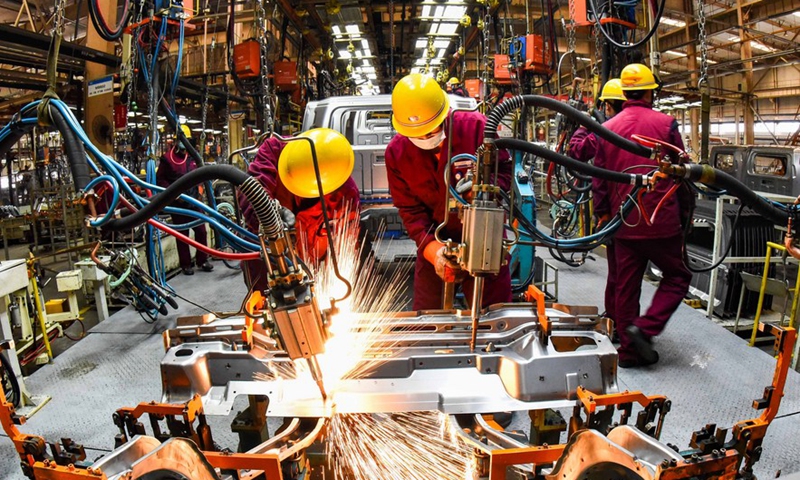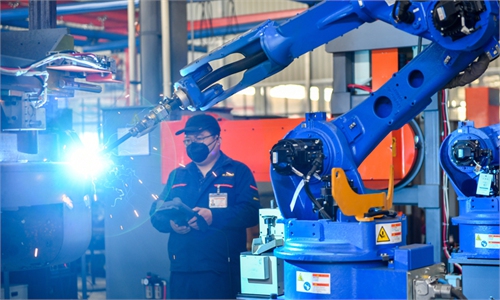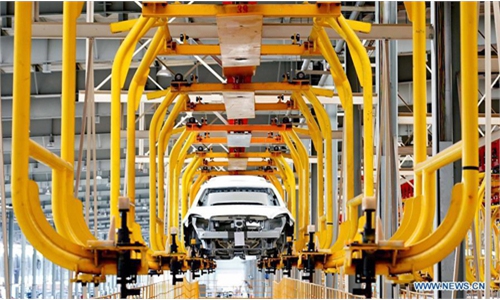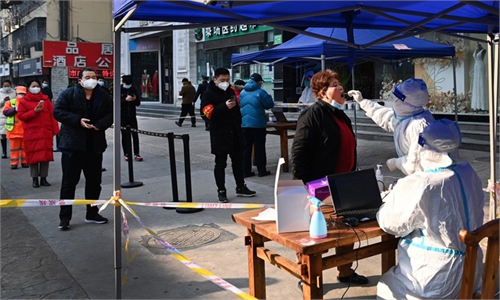China vows more policy support to keep economy in reasonable range
‘All-out efforts’ to ensure supply chain stability, support SMEs: MIIT

Workers weld at a workshop of an automobile manufacturing enterprise in Qingzhou City, east China's Shandong Province, Feb 28, 2021.Photo:Xinhua
Chinese Premier Li Keqiang on Thursday called for further increased support for companies, expedited construction of major projects and enhanced regulation of energy supplies to improve work in the first quarter, as the Chinese economy is facing "new" downward pressure.
In a meeting on this year's Government Work Report, which usually contains GDP growth and other targets for the year, Li also urged the enhancement cross-cycle adjustment and macro policy implementation and launching of more practical measures to address risks and keep the economy operating within a reasonable range.
The renewed calls come as various Chinese government departments are moving swiftly to adopt measures to tackle challenges in various areas.
On Thursday, the Ministry of Industry and Information Technology (MIIT) said that it will implement a slew of more powerful and effective policies to keep industrial growth steady, which will act as a stabilizer for the country's economy that faces a severe, complex and uncertain external environment.
Efforts will be made to boost investment in the manufacturing sector, expand consumer demand, and develop new growth drivers for digital industries like 5G, artificial intelligence (AI) and virtual reality (VR), according to the ministry.
Also, the MIIT will coordinate efforts with other government departments to ensure energy production and the stable operation of industry and supply chains.
"In 2022, China's industrial and economic development will face the pressures of shrinking demand, supply shocks and weakening expectations, and the task of maintaining steady growth remains daunting," Tian Yulong, chief engineer and spokesman of the MIIT, said during a press conference on Thursday.
On the basis of epidemic prevention and control and the implementation of existing policies and measures, China will make all-out efforts to introduce more powerful and effective policies and measures in areas such as fiscal, taxation and finance, to ensure supply and price stability, and supporting the development of small and medium-sized enterprises (SMEs), in light of new circumstances and changes, Tian Yulong said.
To help SMEs, more policies are likely to focus on cutting taxes and fees, providing more financing channels and unleashing consumption potential; more importantly, difficulties need to be solved at the industry chain level, Tian Yun, former vice director of the Beijing Economic Operation Association, told the Global Times on Thursday.
Export-oriented companies in particular are expecting more policy supports.
An export e-commerce company based in Ningbo, East China's Zhejiang Province, with about 200 employees, said that since the outbreak of the epidemic in 2020, many favorable policies have been introduced, such as tax cuts and efficient electronic customs clearance.
"It is hoped that there will be more platforms like the Canton Fair to allow export companies to connect with the domestic market when overseas demand is unstable," a manager surnamed Shi, told the Global Times on Thursday.
More policies targeting SMEs have been announced. The State Council, the cabinet, recently issued a policy for labor-intensive export enterprises, asking local governments to reduce burdens and increase policy support for export credit and export insurance, in accordance with WTO rules.
The Ministry of Commerce also said on Thursday that it will spare no effort to stabilize foreign trade by encouraging traditional industries like shoemaking to develop new business models. The ministry will help enterprises actively explore the international market, ensure the stability and smooth flow of industry and supply chains, and promote the high-quality development of traditional export industries.
The MIIT spokesman stressed that industrial growth should be based on the current epidemic prevention and control measures. China is implementing a "dynamic zero-COVID" policy.
As a result of the policy, manufacturing added value increased by 9.8 percent year-on-year in 2021, accounting for 27.4 percent of GDP in the first three quarters, per data from MIIT.
China's economic and industrial growth shows its COVID-19 prevention and control policies are conducive to industry and supply chains, said the MIIT spokesperson, responding to questions about China's "zero-COVID" policy.
The impact of the "zero-COVID" policy is concentrated in the catering and urban services sectors of the domestic economy, which account for less than 2 percent of GDP, meaning the impact on the overall economy is small, Wang Dan, chief economist of Hang Seng Bank (China), told the Global Times.
"In terms of global supply chains, China's 'zero-COVID' policy help maintain the integrity of industry chains and stabilize market expectations. Chinese ports and factories suffered sporadic disruptions last year, but were quickly restored due to efforts to contain the spread of the coronavirus," said Wang.



